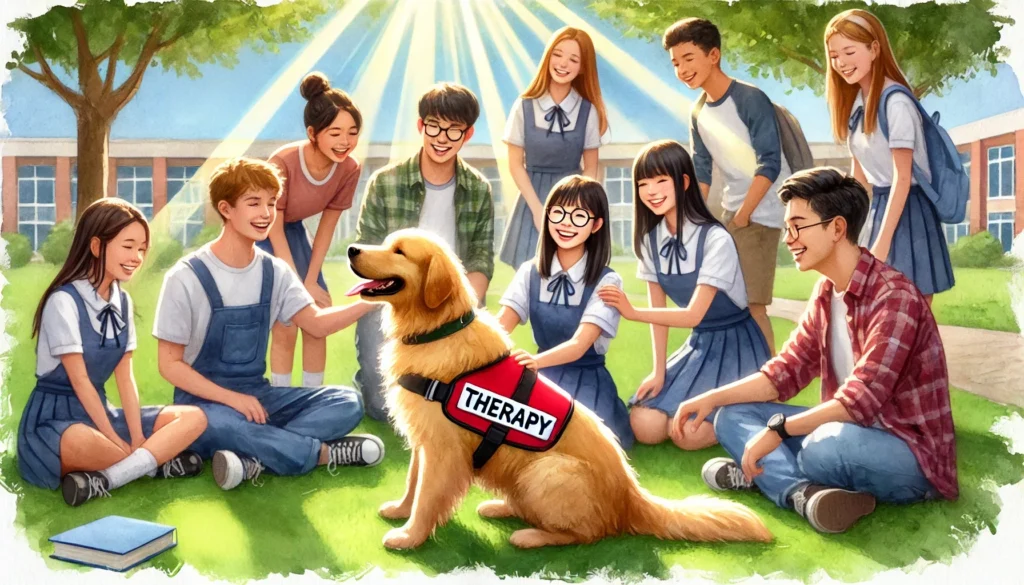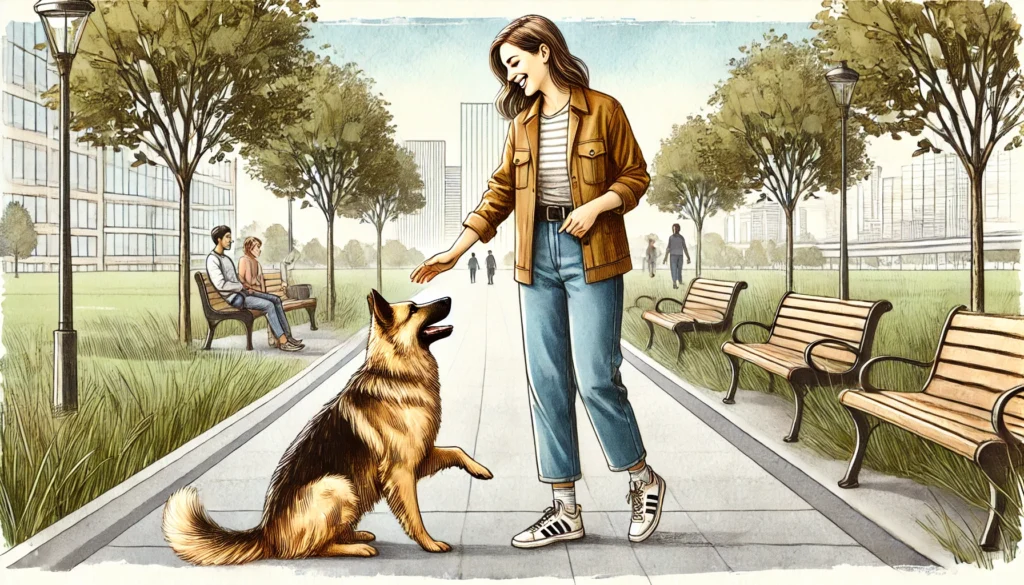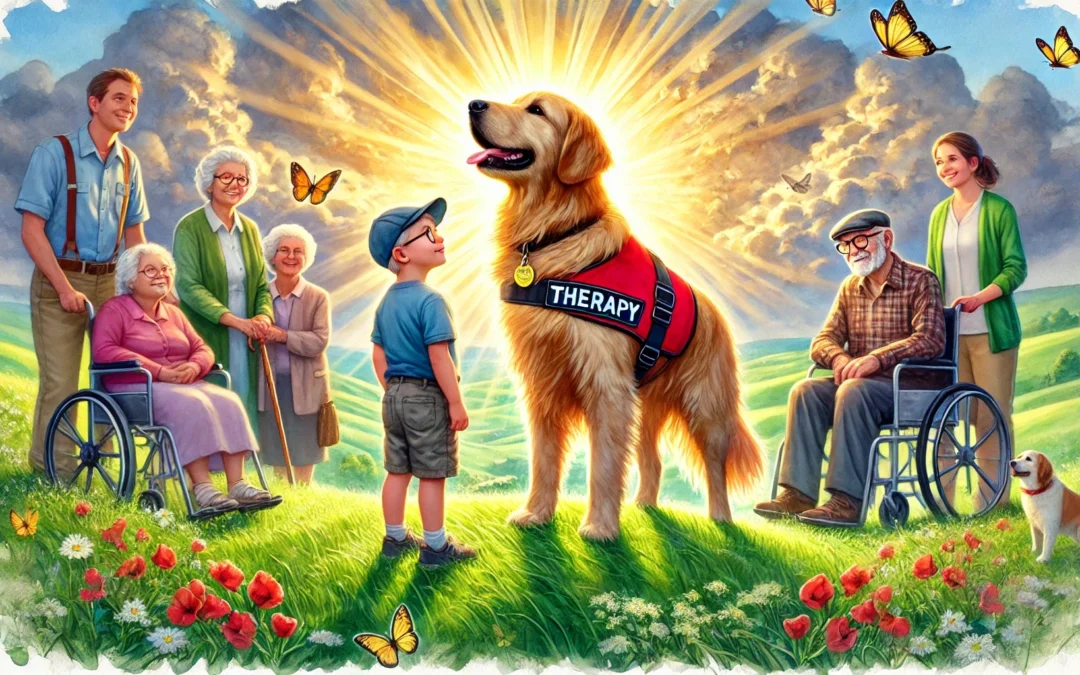Therapy Dogs and Mental Health Support
For those living with anxiety disorders, panic attacks, or specific phobias, therapy dogs offer a unique kind of support. These specially trained animals help people feel safe, relaxed, and connected within their environment.
Whether you’re struggling with a general fear or a more specific dog phobia, working with therapy dogs can reduce stress, lower blood pressure, and ease symptoms of depression and other mental illnesses.
Both children and adults benefit from bonding with a pet dog or engaging in sessions with a trained therapy dog. Dog owners often report improved mental health, increased confidence, and stronger emotional resilience. That’s the feedback we get from clients but, scientific research has also show that that interacting with dogs helps both or mental and physical health!
Animal-Assisted Therapy: The Science and Benefits
Animal-assisted therapy is a proven method of treating anxiety, phobias, and other mental health conditions. This approach is recommended by healthcare professionals and supported by ongoing behaviour research.
Benefits of animal-assisted therapy include:
- Reduced blood pressure and heart rate
- Enhanced mood and mental well-being
- Improved communication skills
- Support for overcoming other phobias and fears
Get in Touch to Find Out How Therapy Dogs Could Help You
Interacting with therapy dogs has been shown to lower cortisol levels, the body’s primary stress hormone. This interaction also boosts oxytocin, promoting feelings of trust and bonding. Such hormonal changes can alleviate symptoms of anxiety and depression. A study by the Ohio State University Wexner Medical Centre found that healthcare workers who engaged with therapy dogs reported a significant improvement in mood and reduced emotional exhaustion.

Therapy Dogs Improve Health and Lower Blood Pressure
1. Short-Term Interaction Studies Show Reduced Blood Pressure
Classic controlled research found that talking to and petting a dog was associated with lower blood pressure compared with human conversation. This was observed in undergraduates during controlled interactions.
Studies summarised in a large review note that blood pressures were significantly lower when stroking a dog compared to other activities, and lowest during rest, suggesting a calming effect of tactile interaction with dogs.
2. Pet Therapy (Animal-Assisted Interventions) Lowers BP and Heart Rate
A clinical trial with older adults (pet therapy visits vs volunteer-only visits) found significant decreases in both blood pressure and heart rate during pet therapy sessions, supporting structured dog interaction for cardiovascular benefits.
A recent 2025 study involving university students showed that expectation and interaction with certified therapy dogs reduced stress markers (including pulse and cortisol), which are closely linked to blood pressure regulation.
3. Broader Reviews Find Positive Associations
Reviews of pet ownership and cardiovascular effects show that dog ownership is often linked with lower stress responses and smaller blood pressure increases under stress, likely through social support mechanisms.
Clinical guidelines and health organisations like the American Heart Association report that petting a dog can decrease blood pressure, while overall pet ownership is associated with improved cardiovascular risk profiles.
4. Systematic Evidence on Human–Animal Interaction
A systematic review of how animals affect physiological markers found that many studies show co-modulation of stress biomarkers (like heart rate, blood pressure, and hormone levels) during human–dog interaction, though results vary with study design
Helping a Wide Range Of People, Young and Old
Therapy dogs provide support to various groups, including students, veterans, and older people. In settings like nursing homes, schools, and therapy clinics, therapy dogs nationwide are helping people cope with emotional challenges. This kind of support encourages people to live life more freely and with less fear.
Therapy Dogs Help Students Relax and Increase Emotional Well-Being
A study at Washington State University revealed that students who interacted with therapy dogs experienced decreased stress and increased self-compassion.
The unstructured drop-in sessions, eheld over several months, allowed students to interact freely with dogs. Unlike structured programs, these flexible visits mirrored real-life pet interactions and proved more adaptable for universities. Participants who joined multiple sessions experienced the greatest improvements in emotional well-being and resilience.
Researchers noted that relaxed environments, gentle dog interactions, and conversations with other students and handlers all contributed to better mental health outcomes. According to lead author Patricia Pendry, these cumulative effects show that low-cost, ongoing dog therapy programmes may be a powerful tool for student well-being. With growing mental health concerns in higher education, universities are encouraged to implement similar animal-assisted interventions. To ensure safety and animal welfare, any such programme should be well-monitored and rooted in current research.
Another great example of a dog helping young people is a Golden Retriever named Peaches. She is employed by the North East London NHS Foundation Trust (NELFT) to assist in mental health services for children and young people. Working with Senior Mental Health Practitioner Cara Johnston, Peaches participates in one-on-one sessions, group workshops, and school visits. Her involvement has been linked to increased engagement, reduced anxiety levels, and improved therapeutic outcomes among young clients.

Therapy Dogs Bring Joy to Older People
Similarly, older people in care homes reported reduced feelings of loneliness after regular visits from therapy dogs. The National Health Service (NHS) in the UK has been integrating therapy dogs into various healthcare settings to support patients’ mental and emotional well-being. These canine companions offer comfort, reduce stress, and foster social interactions among patients and staff. These dogs can even help older people who have given up on life to start eating and engaging with others again. They can be real miracle workers!
At East Lancashire Hospitals NHS Trust (ELHT), a Cockapoo named Alfie serves as the official therapy dog, affectionately titled the ‘Head of Happiness’. Introduced in January 2022 through a grant from NHS Charities Together, Alfie works alongside Chaplain and Therapy Dog Practitioner Rachel Fielding. Based at the Spiritual Care Centre at Royal Blackburn Teaching Hospital, Alfie visits patients and staff across all ELHT sites, providing emotional support and companionship. His presence has been particularly beneficial in uplifting the spirits of patients facing challenging treatments and in facilitating meaningful conversations.
Teddy, a Labrador Retriever, serves as a therapy dog at Cumbria, Northumberland, Tyne and Wear NHS Foundation Trust (CNTW), specifically aiding patients with dementia. Owned by Advanced Nurse Practitioner Julie Young, Teddy visits the Woodhorn Ward at St George’s Park in Morpeth three times a week. His presence has been instrumental in improving patients’ emotional well-being, encouraging social interaction, and providing a calming influence during stressful situations.

Exposure Therapy for Dog Phobias
Exposure therapy is one of the most effective treatments for dog phobias. It involves gradually introducing the individual to the source of fear—starting with active imaginal exposure, and moving toward contact with a live dog.
Exposure therapy, particularly when involving dogs, has proven effective in treating cynophobia—the intense fear of dogs. This therapeutic approach gradually introduces individuals to dogs in controlled settings, allowing them to confront and desensitise their fears. Research indicates that such exposure can significantly reduce anxiety levels and avoidance behaviours associated with phobias. For instance, a study conducted at Washington State University highlighted that systematic and prolonged exposure to dogs enabled patients to experience these situations without adverse responses, leading to substantial improvements in their condition.
Moreover, integrating therapy dogs into exposure sessions offers additional benefits. These animals provide non-judgemental support, helping individuals feel more at ease during therapy. The presence of a calm and friendly dog can facilitate positive interactions, reinforcing the notion that dogs are not inherently threatening. Such interactions not only aid in diminishing fear responses but also promote emotional well-being. Consequently, exposure therapy with dogs stands out as a compassionate and effective method for overcoming cynophobia.
Developing cynophobia – a severe fear of dogs – can result from:
- Negative childhood experiences
- Learned fear from family members
- Lack of interaction with dogs or other animals
Through professional treatment, including relaxation techniques and cognitive behavioural therapy, individuals can overcome extreme fear and build a healthier relationship with dogs.

How Therapy Dogs Improve Daily Life Nationwide
Therapy dogs aren’t just found in clinics—they’re part of everyday life across the UK. From home, workplaces to schools, these animals help reduce anxiety, improve mental health, and offer emotional support.
A pet dog provides consistent companionship, boosting confidence and improving emotional stability. For many, having a dog at home leads to reduced panic episodes and a stronger sense of control. In many ways, every pet dog is a therapy dog in their own right!
Across the UK, therapy dogs nationwide play an essential role in helping people tackle specific phobias, increase relaxation, and experience more fulfilling daily lives. Though seeing eye dogs serve a practical role to help the blind get around more safely, they also provide a deep connection through their bond and trust. The same goes with other working dogs such as police dogs or drug sniffing dogs. They do more than just accomplish a job, they support the people who work with them, making every day full of fun, love, and trust.
Creature Courage: The Best Dog Phobia Treatment in the UK
At Creature Courage, we help people overcome dog phobias and other animal-related fears through safe, guided exposure therapy. Our powerful step-by-step therapy will help you learn how to interact safely with dogs and learn techniques to overcome panic and fear. We have some amazing therapy dogs who would love to meet you and support you on your journey to wellness and freedom!
Whether you have a child who’s scared to encounter dogs, or you’re an adult struggling with panic attacks every time you see a dog, or just someone who wants to feel more comfortable around animals, our therapy is designed to help you live life without fear and more freedom. The best part is, most people only need one day to radically change their lives! Get in touch and let us tell you more about how our therapy works.
Take The First Step to Overcoming Your Fear of Dogs

Frequently Asked Questions (FAQs)
How do therapy dogs help with anxiety disorders?
Therapy dogs reduce stress, encourage relaxation techniques, and support people during exposure to anxiety triggers in a controlled environment.
What’s the difference between a therapy dog and a pet dog?
A therapy dog is trained to help multiple people in public settings, while a pet dog provides one-on-one emotional support at home.
How does exposure therapy treat dog phobia?
Gradual exposure to dogs—starting with images or virtual tools, progressing to interaction with a live dog – helps reduce fear responses over time.
Can children benefit from therapy dogs?
Yes! Encouraging children to interact with therapy dogs improves confidence and helps reduce intense fear of dogs.
Do I need a mental health diagnosis to work with therapy dogs?
Not necessarily. Many people seek help before symptoms escalate. Working with mental health professionals ensures you receive the right level of care.
Are therapy dogs available across the UK?
Absolutely. There are therapy dogs nationwide available through schools, clinics, and specialist programs like Creature Courage.
How do I seek treatment for fear of dogs?
Contact a trusted organisation like Creature Courage. We offer expert-led exposure therapy and support programs for anyone ready to face their dog phobia.

Therapy dogs transform lives by supporting recovery from anxiety disorders, dog phobia, and other mental health challenges. Whether through exposure therapy, owning a pet dog, or engaging in animal-assisted therapy, there’s a path forward. Let Creature Courage guide you toward a calmer, more confident life. Get in touch today.

